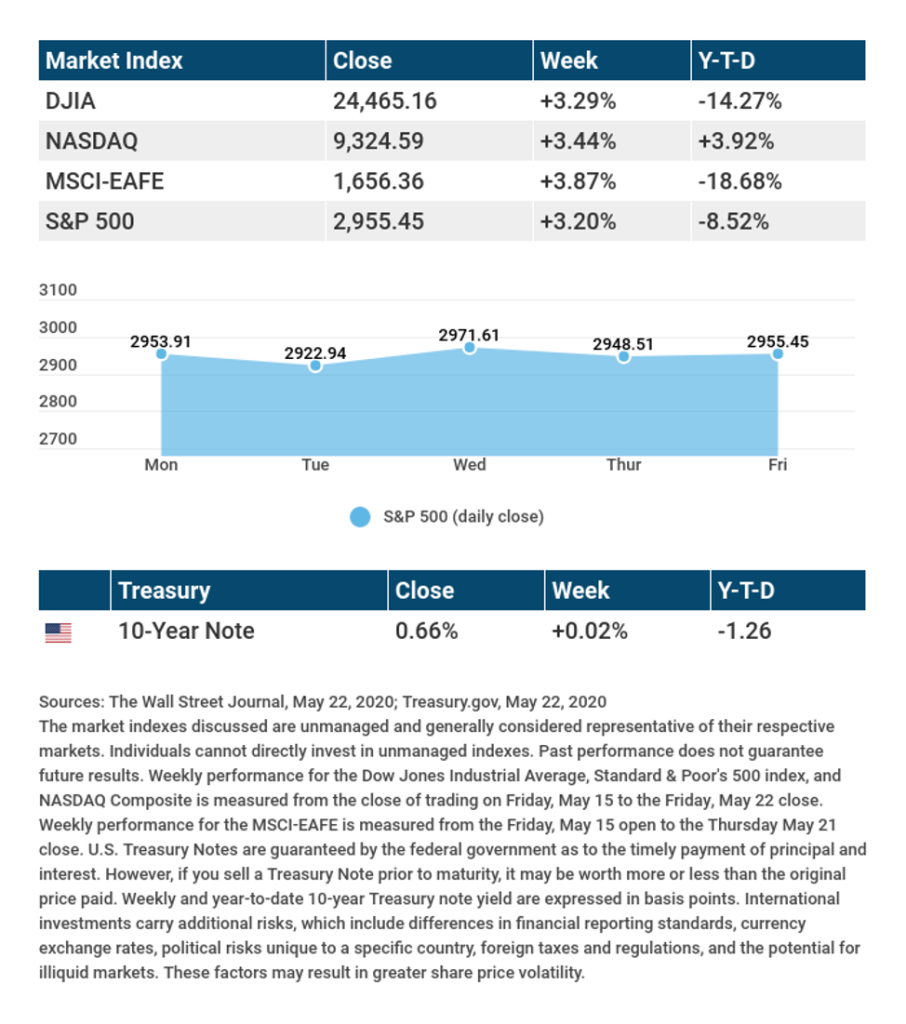The Week on Wall Street
Upbeat comments by the Federal Reserve Chairman and more signs of an economic turnaround combined to help fuel a powerful rally in the stock market last week.
The Dow Jones Industrial Average rose 3.29%, while the Standard & Poor’s 500 advanced 3.20%. The Nasdaq Composite index climbed 3.44% for the week. The MSCI EAFE index, which tracks developed overseas stock markets, gained 3.87%.[1][2][3]
Stocks Cheer Fed Support
The markets surged higher to open the week, buoyed by a Sunday night “60 Minutes” interview with Fed Chair Jerome Powell, who said that the Federal Reserve would do everything necessary to support economic recovery. Rising oil prices and more states lifting restrictions added to the overall improving investor outlook.
After a day digesting those gains, stocks moved another leg higher on strong earnings from big retailers and growing optimism over the global economic recovery. Stocks drifted in the final two days of trading as investors worried about heightening tensions between the U.S. and China.
Different Views on the Economic Recovery
Treasury Secretary Steven Mnuchin and Fed Chair Powell testified last week before the Senate Banking Committee, providing Senators with two different views of the nation’s economic outlook.[4]
Secretary Mnuchin suggested a wait-and-see approach before moving ahead with additional fiscal measures. He wants to pause new spending in order to first assess the impact of the already-approved stimulus program. He believes that the economy will experience a “V-shaped” recovery.[5]
Fed Chair Powell, on the other hand, expressed worries that waiting too long for additional fiscal measures may hamper the fragile economic recovery. It was the third time in a week that the Fed Chair suggested more federal spending is needed to help the economic recovery.[6]
Final Thoughts
One of the challenges of assessing the U.S. economy using certain government reports, like the consumer price index or the employment report, is that they are considered “lag indicators.” Lag indicators provide good insight into where we’ve been, but are less helpful in looking at the current state of economic activity.
Looking at some “real-time” data can help investors better assess the here-and-now. For example, gasoline deliveries are trending higher, consumer confidence appears to have stabilized, and airlines are seeing more bookings. Even the supply of toilet paper seems less of a concern these days, with Google searches falling to near normal levels.[7][8]
THIS WEEK: KEY ECONOMIC DATA
Tuesday: Consumer Confidence. New Home Sales.
Thursday: Jobless Claims. Durable Goods Orders. Gross Domestic Product (GDP).
Source: Econoday, May 22, 2020
The Econoday economic calendar lists upcoming U.S. economic data releases (including key economic indicators), Federal Reserve policy meetings, and speaking engagements of Federal Reserve officials. The content is developed from sources believed to be providing accurate information. The forecasts or forward-looking statements are based on assumptions and may not materialize. The forecasts also are subject to revision.
THIS WEEK: COMPANIES REPORTING EARNINGS
Tuesday: Autozone (AZO)
Wednesday: HP (HPQ), Workday (WDAY), Autodesk (ADSK)
Thursday: Salesforce.com (CRM), Costco (COST), Trip.com (TCOM), Okta (OKTA), Dollar General (DG), Dell Technologies (DELL), VMware (VMW)
Source: Zacks, May 22, 2020
Companies mentioned are for informational purposes only. It should not be considered a solicitation for the purchase or sale of the securities. Any investment should be consistent with your objectives, time frame, and risk tolerance. The return and principal value of investments will fluctuate as market conditions change. When sold, investments may be worth more or less than their original cost. Companies may reschedule when they report earnings without notice.

Investing involves risk including the potential loss of principal. No investment strategy can guarantee a profit or protect against loss in periods of declining values.
Diversification does not guarantee profit nor is it guaranteed to protect assets.
International investing involves special risks such as currency fluctuation and political instability and may not be suitable for all investors.
The Standard & Poor’s 500 (S&P 500) is an unmanaged group of securities considered to be representative of the stock market in general.
The Dow Jones Industrial Average is a price-weighted average of 30 significant stocks traded on the New York Stock Exchange and the NASDAQ. The DJIA was invented by Charles Dow back in 1896.
The Nasdaq Composite is an index of the common stocks and similar securities listed on the NASDAQ stock market and is considered a broad indicator of the performance of stocks of technology companies and growth companies.
The MSCI EAFE Index was created by Morgan Stanley Capital International (MSCI) that serves as a benchmark of the performance in major international equity markets as represented by 21 major MSCI indices from Europe, Australia, and Southeast Asia.
The 10-year Treasury Note represents debt owed by the United States Treasury to the public. Since the U.S. Government is seen as a risk-free borrower, investors use the 10-year Treasury Note as a benchmark for the long-term bond market.
Opinions expressed are subject to change without notice and are not intended as investment advice or to predict future performance.
Past performance does not guarantee future results.
You cannot invest directly in an index.
Consult your financial professional before making any investment decision.
Fixed income investments are subject to various risks including changes in interest rates, credit quality, inflation risk, market valuations, prepayments, corporate events, tax ramifications and other factors.
These are the views of Platinum Advisor Strategies, LLC, and not necessarily those of the named representative, Broker dealer or Investment Advisor and should not be construed as investment advice. Neither the named representative nor the named Broker dealer or Investment Advisor gives tax or legal advice. All information is believed to be from reliable sources; however, we make no representation as to its completeness or accuracy. Please consult your financial professional for further information.
By clicking on these links, you will leave our server, as the links are located on another server. We have not independently verified the information available through this link. The link is provided to you as a matter of interest. Please click on the links below to leave and proceed to the selected site.
The market indexes discussed are unmanaged and generally considered representative of their respective markets. Individuals cannot directly invest in unmanaged indexes. Past performance does not guarantee future results. The return and principal value of investments will fluctuate as market conditions change. When sold, investments may be worth more or less than their original cost.
- The Wall Street Journal, May 22, 2020
- The Wall Street Journal, May 22, 2020
- The Wall Street Journal, May 22, 2020
- The Wall Street Journal, May 20, 2020
- The Wall Street Journal, May 20, 2020
- The Wall Street Journal, May 20, 2020
- MarketWatch, May 20, 2020
- MarketWatch, May 20, 2020
